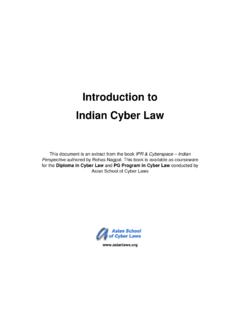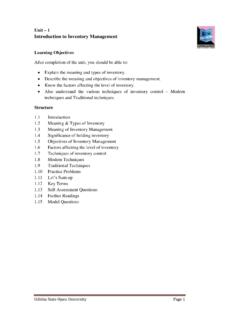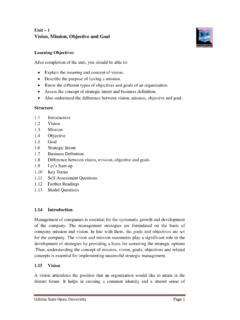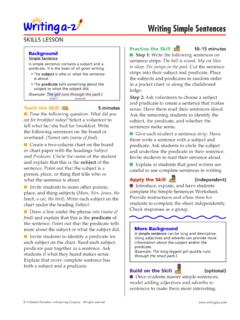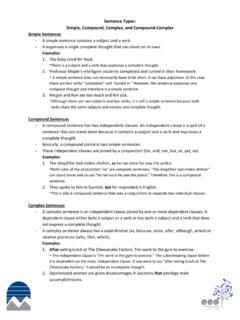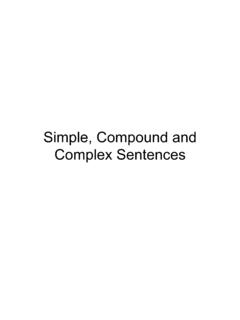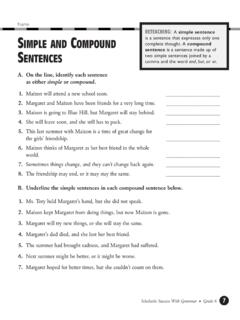Transcription of SIMPLE, COMPOUND AND COMPLEX SENTENCES
1 Unit-1 simple , COMPOUND AND COMPLEX SENTENCES SENTENCES are of three kinds according to their structure. 1. Examples of simple SENTENCES a) Dogs bark. b) The earth moves round the sun. c) Harsha bought a pen. Dogs, The earth and, Harsha are used as the Subjects in these SENTENCES . The predicate part of the SENTENCES begins with the verb. The verbs in the Predicate parts are Finite verbs as they show tense. 2. Examples of COMPOUND SENTENCES :- a) Manisha is a teacher and her brother is a doctor. b) The boy entered the room and came out after ten minutes. c) He worked hard, but failed the examination. d) Study hard, otherwise you will fail. Each sentence has two clauses:- Sentence (a) :- I. Manisha is a teacher. II. Her brother is a doctor. (Co-ordinator -- and) Sentence (b) :- I. The boy entered the room. II. The boy came out after ten minutes. (Co-ordinator-- and) A sentence which has only one subject followed by a finite verb in the predicate part is known as the simple sentence.
2 A sentence in which two independent clauses are joined by a coordinator is known as a COMPOUND sentence. Sentence (c) :- I. He worked hard. II. He failed the examination. (Co-ordinator -- but) Sentence (d) :- I. Study hard. II. You will fail. (Co-ordinator -- otherwise) Clause-1 Subject Predicate Co-ordinator Clause-2 Subject Predicate a) Manisha is a teacher and her brother is a doctor b) The boy entered the room and (he) came out after ten minutes c) He worked hard but (he) failed the examination d) (You) Study hard otherwise you will fail 3. Examples a) Doctors claim that cancer is curable. b) Students stood up when the teacher entered the classroom. c) The teacher punished the student who told a lie. d) Thieves left the place as soon as they saw the police. Main or Independent Clause Sub-ordinate or Dependant Clause a) Doctors claim that cancer is curable b) Students stood up when the teacher entered the class room.
3 C) The teacher punished the student who told a lie. d) Thieve left the place as soon as they saw the police There are five simple SENTENCES , three COMPOUND SENTENCES and two COMPLEX SENTENCES in the following passage. Write, simple , COMPOUND or COMPLEX . 1. Life is a bed of thorns. A sentence which consists of a main clause (an independent clause) and one or more subordinate(dependent) clause is known as a COMPLEX sentence. ACTIVITY-1 2. It is never a bed of roses. 3. Man struggles hard to earn his living. 4. He runs after money and wants to enjoy power. 5. In the race for money and power he gets hurt. 6. Fears, worries and frustration hurt his mind. 7. He becomes restless and loses peace of mind. 8. He realises that money is not everything in life. 9. It gives temporary satisfaction, but robs him of peace and happiness in life. 10. What makes man happy is contentment. Separate the subject from the Predicate in the following SENTENCES . 1. He had no answer to my question.
4 2. Serpents move very fast. 3. Constant illness compelled him to discontinue his study. 4. Gardening, collecting stamps, drawing pictures, making paintings, catching fish, taking photographs etc., are the examples of common hobbies. 5. The temporary sheds and stalls for the sellers in the market collapsed in the recent rain. The following are the main patterns of the simple SENTENCES in English. PATTERN-1 SV Examples: a) Fire burns. b) Gold glitters. c) The child cried. d) The moon is shining. PATTERN-2 SVO Examples: a) The teacher praised the student b) We bought a new car. c) She sang a Meera bhajan. d) Valmiki wrote the Ramayana. ACTIVITY-2 SUBJECT + VERB SUBJECT + VERB + OBJECT PATTERN-3 SVOO Examples:- a) Grandma told me a fairy tale. b) The postman gave me a letter. c) His father bought him a laptop. d) The teacher asked the students a simple question. PATTERN-4 SVC Examples a) The child appears innocent.
5 B) She feels cold. c) She looks beautiful. d) Munabhai became a doctor. e) Father is tried. PATTERN-5 SVOC Examples a) We elected Mr. Mohanty Chairman. b) Noble deeds make a person immortal. c) Modern scientists have proved the theory wrong. d) Police found the man guilty. The SENTENCES in the following passage are in different patterns. Identify the pattern of each sentence and mention the pattern against the respective sentence. 1) I have read theRamayana. 2) Maharshi Valmiki wrote this famous epic. 3) It deals with the life and work of lord Ramachandra. 4) He was the son of Dasaratha of Ayodhya. 5) It also tells us the story of Ravan, the demon king of Lanka . 6) People called Ramachandra Purushottam. 7) He was an incarnation of God. SUBJECT + VERB + (INDIRECT) OBJECT+ (DIRECT) OBJECT SUBJECT + VERB+ COMPLEMENT SUBJECT+ VERB + OBJECT+ COMPLEMENT ACTIVITY-3 8) Ravan was a great politician. 9) Ramachandra, his wife Sita and brother Laxman went to forest.
6 10) King Dasaratha died. 11) Bharat became the king of Ayodhya. 12) But he respected his elder brother Ramachandra. 13) He regarded him God. 14) Ravan in disguise kidnapped Sita. 15) The bird Jatayu saw it. 16) It gave the two grieving brothers this news. 17) Ravan was very arrogant. 18) He did not listen to Ramachandra s request. 19) He did not leave Sita. 20) Ramachandra invaded Lanka. 21) Bibhisan, Sugrib, Hanuman and their men helped Ramachandra. 22) Ramachandra killed Ravan and rescued Sita. TASK FOR WRITING Write a paragraph about how you celebrated your birthday. The SENTENCES in the paragraph should follow different sentence patterns. Write a letter to your friend telling him/ her about your visit to a historical place. Use all types of SENTENCES in the letter. PATTERNS OF OTHER SENTENCE TYPES Interrogative SENTENCES : Yes/No- Type Questions (The answer is either yes or no .) Example: Did you call me? (AUX + S +V+O) Are you ready?
7 (AUX + S + C) Do you know him? (AUX +S + V +O) Wh Type Questions (the answer contains information) Who is sitting there? What is your father s name? ACTIVITY-4 ACIVITY-5 When did the office open? How did the patient die? Where are you going? Imperative SENTENCES Switch off the light. (V + O) (Instruction) Please take it. - (request) Close the door (order) Let s go for a walk (suggestion) Rise early in the morning (advice) Pass me the salt (V + O + O) (Order) In the above SENTENCES , the verbs are used in their base form. The SENTENCES can also be made negative. For example: Don t tell a lie (order) Please, don t insult your friend (request) Don t do anything in haste. (Advice) Don t jump into any early conclusion. Exclamatory SENTENCES Exclamatory SENTENCES express surprise , admiration , sorrow , and other feelings emphatically. Such SENTENCES usually begin with How or What . An exclamation mark (!)
8 Is put at the end of the sentence. Examples: What a beautiful flower it is ! How fast time flies ! What an excellent dancer she is ! How excellently she dances ! Negative SENTENCES (Use of Negative Markers not and never ) He cannot climb a tree. She does not support her husband. I don t watch television. Gopal doesn t take fish. She never takes tea. Rahul has not eaten anything since the morning today. Rewrite the following passage by changing the SENTENCES into negatives. The monitor of our class enjoys good health. He has a pleasing appearance. He is well-dressed. He looks very smart. He is intelligent and well-behaved. He respects all the teachers. He helps the class teachers in keeping discipline in the class. At the end of each period he cleans the blackboard. He is friendly to all. All the teachers like him. All the students love him dearly. Write ten SENTENCES in column-A about what school students generally do on the day of Ganesh Puja.
9 Then in Column-B, write ten SENTENCES about what the students did not do on that day this year in a particular school.(One example is given for you) Column-A Column-B 1 Students decorate the school campus. This year , the students of XYZ school did not decorate the campus. 2 3 4 5 6 7 8 9 10 Write the questions to get the following SENTENCES as answers. (the first one is done for you) 1. Everyone makes mistakes sometimes.(Ans:- Who doesn t make mistakes? ) 2. God will not forget to see the evil. 3. It is most proper to disobey the traffic rule. ACTIVITY- 6 ACITVITY-7 ACTIVITY-8 4. He saw me in the market . 5. He asked me for something. 6. The Prime Minister opened the Exhibition. 7. Dr. Panda gave this medicine. 8. Sanjay told the stories to Dhritarashtra. 9. No, he has not invited me. 10. I am his elder brother. 11. There are five big trees in our school campus. 12. Seven days make a week. 13. I never sleep in day time. 14. Father is not present at home now.
10 15. The dress looks gorgeous. 16. He is not a story teller. 17. I am not a little tired. 18. She doesn t take tea. 19. She can t speak, because she is a dumb 20. He asked why I came. Frame exclamatory SENTENCES for the following expressions. (the first one is solved for you.) 1. Night is very beautiful. (Ans :- How beautiful is night !) 2. She has an attractive face. 3. It is very stupid of me to forget your name. 4. It is a horrible accident. 5. He managed the event efficiently. 6. This is a beautiful park. TASK FOR SPEAKING Write a dialogue between two students about their preparation for the forthcoming examination. Use different sentence-types (interrogatives, negatives, declaratives, imperatives) in the dialogue. You may use the following SENTENCES at necessary points in the dialogue. 1. Oh !Well, it is a simple subject. 2. Oh ! No, it is really hard. 3. Yes ,it is interesting. 4. How sad ! I don t remember these simple things. 5. No, I don t like them.

